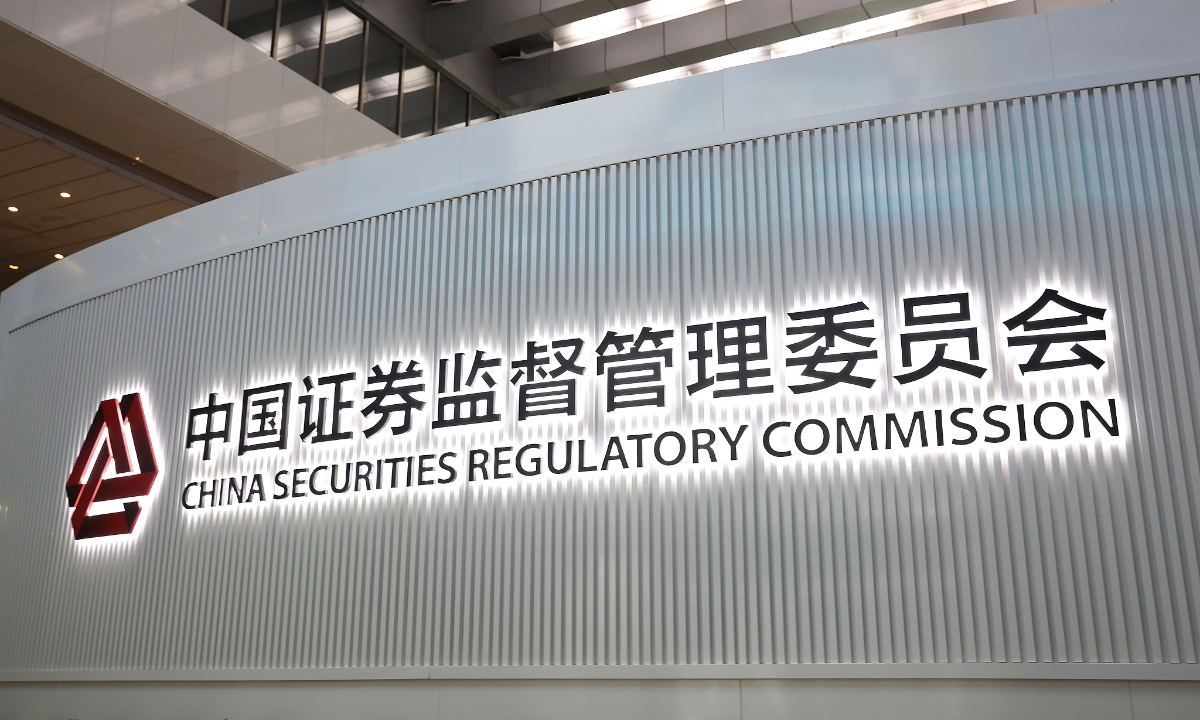Chinese regulator announces raft of policies to boost stock market, investors’ confidence
‘Timely’ measures to boost investors’ confidence

China Securities Regulatory Commission (CSRC) in Beijing Photo:VCG
China's top securities regulator on Friday announced a slew of policies aimed at boosting the Chinese stock market, including cutting transaction fees, vigorously developing equity funds and mulling to open a "green channel" for tech firms that aim for breakthroughs in core technologies.
The move is the latest in China's ever-growing efforts to boost development in various aspects of the Chinese economy so as to stabilize overall economic growth amid challenges, following a tone-setting meeting in July, which also called for efforts to vitalize the capital market to boost investors' confidence.
With the implementation of supportive policies, investors' confidence is expected to gradually improve, thereby boosting the rise of quality companies and the stock market as a whole, analysts said, expressing confidence in the performance of the stock market in the medium and long term.
Investment-side reform will be deepened and equity funds will continue to be vigorously developed, according to a circular on the China Securities Regulatory Commission (CSRC)'s website on Friday. It said that the commission will enlarge the scale and optimize the structure of the public fund industry, and will support the steady development of private equity management products.
In addition, the CSRC said it will draw up an action plan to serve the country's goal of seeking tech self-reliance by building a "green channel" for the financing, bond issuance and merger and acquisitions (M&As) of tech firms that aim to achieve breakthroughs in core technologies.
The commission also said that it will consider extending trading hours for both the stock and bond markets, maintain a "reasonable pace" for new IPOs and refinancing of debt and encourage state-owned firms and large public firms to step up M&As to increase the quality of listed firms.
In the circular, the commission also pledged to come up with effective measures to stimulate the vitality of the Hong Kong stock market and promote the coordinated development of Hong Kong and the Chinese mainland.
Responding to market calls for cutting the stamp duty on stock trades, the CSRC said it has noted the related reports and the previous adjustments of stamp duties played a positive role in reducing transaction costs and stimulating trading.
On Friday, the Shanghai, Shenzhen and Beijing stock exchanges announced that they will further lower transaction fees by up to 50 percent starting from August 28, as part of broader efforts to revitalize the Chinese stock market.
From improving the quality of listed firms to maintaining a "reasonable pace" of IPOs, all of the statements are crucial for the stable operation of the A-share market. This "timely rain" will greatly elevate market confidence and bring in long-term capital, Yang Delong, chief economist at Shenzhen-based First Seafront Fund Management Co, told the Global Times on Friday.
Recently, the Chinese stock market has been on down trend due to multiple factors, but the implementation of a series of support policies will boost macro-economic recovery. As for the capital market, A shares will rise in the medium and long term, Yang said, calling for confidence and patience in the Chinese stock market.
Despite market fluctuations, northbound capital continues to flow into the A-share market this year as investors bet on China's economic potential and resilience. According to data from financial outlet Wind, net inflow of northbound capital exceeded 180 billion yuan ($24.7 billion) in the first half of 2023, up 155.33 percent year-on-year.
While the vitality of the Chinese capital market is not very strong at the moment, it has made a variety of achievements in terms of basic mechanism, the expansion of institutional investors and nurturing of a sci-tech innovation board, Dong Shaopeng, a senior research fellow at the Chongyang Institute for Financial Studies at the Renmin University of China, told the Global Times.
"In particular, the implementation of an across-the-board registration-based IPO system represents a giant leap in the market-oriented reform of China's capital market," he said.
The complex international and domestic situation has also had some impact on the operation of the A-share market, but the central government's strategy of stabilizing and bolstering the economy is clear and the policies are solid. As momentum gathers, the economy will display a sound situation of stable growth in quality and appropriate expansion in economic output, Dong said.
The revenues and profits of listed firms will also gradually recover, and the positive change in economic data will eventually translate into a vibrant capital market, analysts said.



